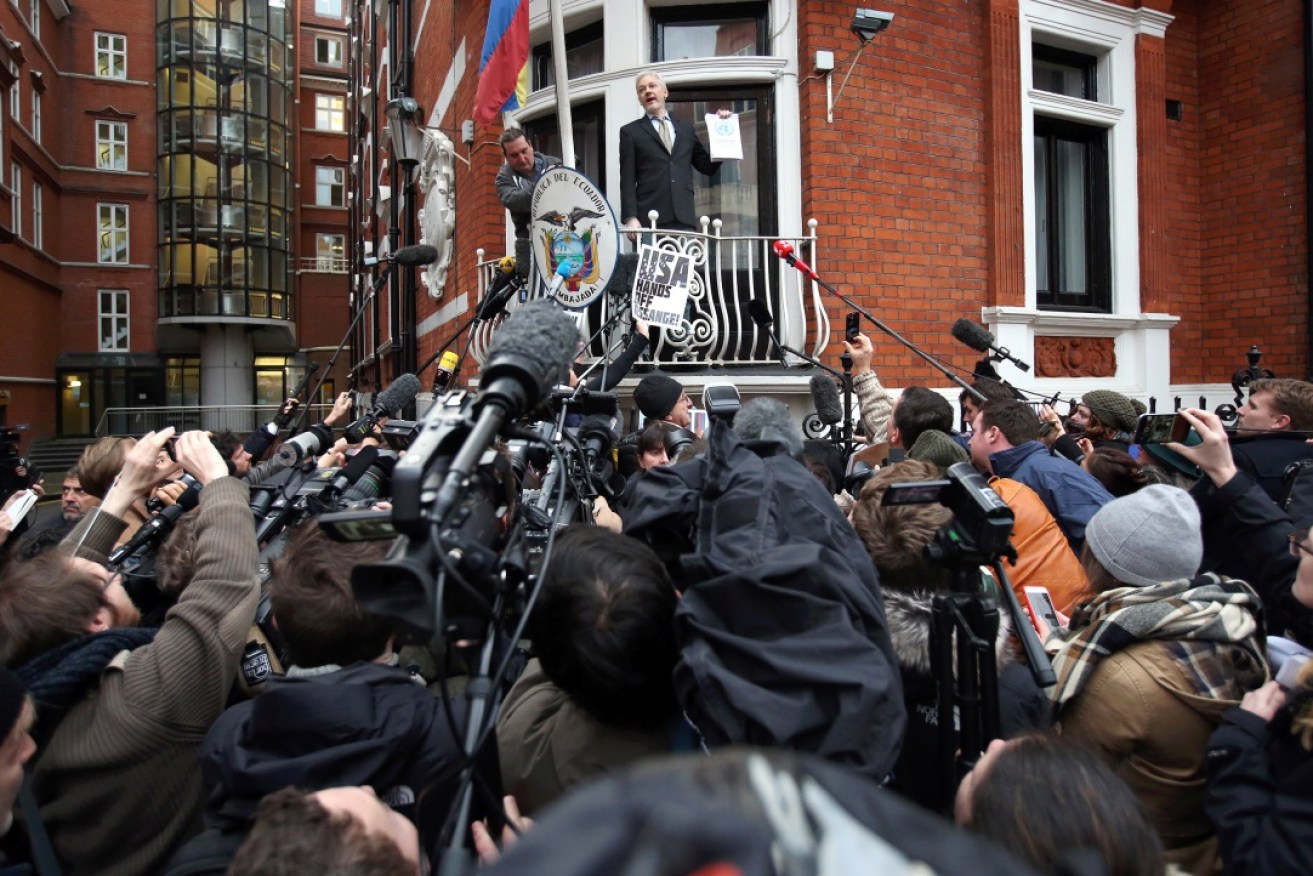Why Ecuador has suddenly turned its back on Julian Assange


Julian Assange has been in the Ecuadorian embassy in London since 2012. Photo: Getty
Julian Assange’s six-year internment in the Ecuadorian embassy in London looks set to end soon, after the nation’s president Lenin Moreno signalled his government was no longer willing to protect the Wikileaks founder.
Behind Ecuador’s sudden abandonment of Mr Assange is an epic political story: The ebbing of the so-called ‘pink tide’ of Latin American socialism.
This movement, characterised in part by its open hostility to United States “imperialism”, surged across South America in the first decade and a half of the 21st century, and was perhaps best personified in former Venezuelan president Hugo Chavez.

The poster boys of the pink tide, from left to right: Venezuela’s Hugo Chavez, Ecuador’s Rafael Correa and Bolivia’s Evo Morales in 2007. Photo: Getty
But it also had a powerful figure in former Ecuadorian president Rafael Correa, who left the presidency last year and whose departure was another unexpected nail in the coffin of this massive but somewhat under-reported movement.
But before getting into that …
What will happen to Assange when he’s turfed out?
Mr Assange’s original reason for entering the embassy – fear of being extradited to Sweden, and from there extradited to the US on espionage charges – is no longer an issue. The Swedish investigation into rape allegations against him has been dropped.
That means the only existing charge the Wikileaks founder faces is for failing to turn up to a UK court hearing, which carries only a maximum three-month prison sentence.
That, though, is not what Mr Assange is afraid of. After all, he’s been in the Ecuadorian embassy for 24 times that period already.
Mr Assange’s lawyers say the real fear is that the US government will request the UK government to extradite him to face much more serious espionage charges – the sort of charges that saw whistleblower Chelsea Manning sentenced to 35 years in prison (though President Obama commuted her sentence after seven).
The US has not said it would request extradition. But if it did, Mr Assange would be able to defend himself against the charges in UK courts. Given espionage charges carry the death penalty in the US, and given the UK will not extradite people if there is a danger they will be executed, Mr Assange’s case looks quite strong.
But the US may level different charges against him that don’t carry the death penalty.
What’s been happening in Ecuador
If you’re familiar with the potent anti-American populism of Hugo Chavez, then Rafael Correa was a similar, if less wildly charismatic, character.
To his enemies an authoritarian populist who suppressed his critics, to his supporters a champion of the poor, Mr Correa came to power in 2007 on the promise of leading a “citizens revolution” of social programs funded by oil dollars, anti-austerity, and standing up to US “imperialism”.

Ecuador’s new president Lenin Moreno with Pope Francis. Photo: Getty
As far as reducing poverty went, Mr Correa was pretty successful.
According to US think tank the Centre for Economic and Policy Research, during Mr Correa’s 10 years in office, poverty fell by 38 per cent, and extreme poverty fell by 47 per cent.
His government doubled spending on social programs, and also oversaw average GDP growth of 1.5 per cent a year.
Emboldened by the success of Mr Chavez in Venezuela, Evo Morales in Bolivia, and Fidel Castro in Cuba, Mr Correa was defiant of the US throughout, and his support of Mr Assange was part of this anti-American wave of self-confidence.
Last year, Mr Correa stepped down as president. In the ensuing presidential election, his loyal vice president Lenin Moreno narrowly defeated the more pro-business and US-friendly opposition candidate, on a platform to continue Mr Correa’s “citizens revolution”.
Almost immediately, Mr Moreno abandoned his party’s socialist positions in a dramatic and perplexing way, and was quickly expelled from his party. Since then he has courted conservative and big business elements in the country – drawing praise from economically liberal (‘neo-liberal’ to their detractors) voices like The Economist, and bitter condemnation from the left.
Mr Moreno’s abandonment of Julian Assange is part of this. He recently described Mr Assange as “a stone in our shoe”. Last week UK newspaper The Times reported an inside source stating Mr Assange would lose his asylum status “imminently” and would “be expelled from the embassy”.
Mr Correa, meanwhile, is in voluntary exile in Belgium. He faces charges of bribery in Ecuador, crimes he claims are politically motivated.
The death of Hugo Chavez in 2013 and Fidel Castro in 2016, and the collapse in the price of oil in mid-2014 has left the Latin American ‘pink tide’ with neither a spiritual leader nor an economic base. Mr Assange’s status as political refugee looks set to be a casualty in the ebbing of this tide.








